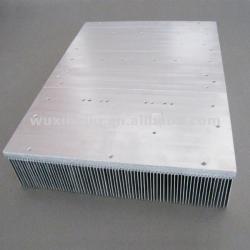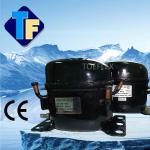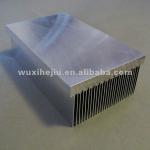Heat sink 228(W)*50(H)*300(L)mm
1.bonded fin heatsink with dense and high fins, 2.various samples for prototype are available, 3 customized designs are accepted - details see: https://www.machineto.com/heat-sink-228-w-50-h-300-l-mm-10247623
| Place of Origin:Jiangsu China (Mainland) | Brand Name:HJ | Application:Heat sink | Certification:RoHS |
| Material:AL 6063 T5 or according to customers' requirement | Spacing between fins:minimum 2 mm | fin thickness:0.8mm&1mm&1.2mm&1.5mm&2mm | sizes:50mm<width<1000mm&50mm<height<200mm |

- Custommized bonded fin heatsinks can be made without molds,so various samples for testing can be available.
- Various dimensions (width,height, length,fins thickness, air gap)can be modified according to customers' design.
- Excellent performance of heat dissipation because of large surface with serried fins .Compared with extrusion heatsink, usually,with same external sizes,bonded fin heatsinks increase over twice surface areas of heat dissipation ,so it has much better performance of thermal transfer
- Optimum design for different types,associated design parameter is provided.
- Widely applied in Appliances ,Electronic industry,Communication , Lighting and New energy device, especially such as heat semiconductor ( IGBT) cooling of UPS,Inverter,AC drivers and Transducer etc.
- Surface treatment: anodized (black),powder coated,polished,mill finished,sand blasting,wiredrawing and so.
- Material : Al 6063 T5 or according to customers' requirement.
What characteristics make a heatsink a good one? There's a number of factors to consider:
- High heatsink surface.It's at the surface of the heatsink where the thermal transfer takes place. Therefore, heatsinks should be designed to have a large surface, this goal can be reached by using a large amount of fine fins, or by increasing the size of the heatsink itself.
- Good aerodynamics.Heatsinks must be designed in a way that air can easily and quickly float through the cooler, and reach all cooling fins. Especially heatsinks having a very large amount of fine fins, with small distances between the fins may not allow good air flow. A compromise between high surface (many fins with small gaps between them) and good aerodynamics must be found. This also depends on the fan the heatsink is used with: A powerful fan can force air even through a heatsink with lots of fine fins with only small gaps for air flow - whereas on a passive heatsink, there should be fewer cooling fins with more space between them. Therefore, simply adding a fan to a large heatsink designed for fanless usage doesn't necessarily result in a good cooler.
- Good thermal transfer within the heatsink.Large cooling fins are pointless if the heat can't reach them, so the heatsink must be designed to allow good thermal transfer from the heat source to the fins. Thicker fins have better thermal conductivity; so again, a compromise between high surface (many thin fins) and good thermal transfer (thicker fins) must be found. Of course, the material used has a major influence on thermal transfer within the heatsink. Sometimes, heat pipes are used to lead the heat from the heat source to the parts of the fins that are further away from the heat source.
- Perfect flatness of the contact area.The part of the heatsink that is in contact with the heat source must be perfectly flat. A flat contact area allows you to use a thinner layer of thermal compound, which will reduce the thermal resistance between heatsink and heat source.
- Good mounting method.For good thermal transfer, the pressure between heatsink and heat source must be high. Heatsink clips must be designed to provide a strong pressure, while still being reasonably easy to install. Heatsink mountings with screws/springs are often better than regular clips. Thermoconductive glue or sticky tape should only be used in situations where mounting with clips or screws isn't possible.
Kindly,mail us for further informations.

| Packaging Detail:we will offer you the standard package which includes plastic film, foam ,carton and wooden box. which is suitable for transporting by sea or air. |
| Delivery Detail:4 weeks |














